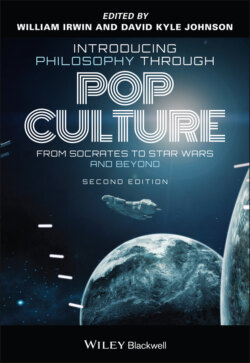Читать книгу Introducing Philosophy Through Pop Culture - Группа авторов - Страница 61
Summary
ОглавлениеBlack Panther challenges racist stereotypes of Black people and culture, suggesting that the absence of a Wakanda‐like nation in the real world is due to Western interference rather than some inherent problem in Black societies. For Black audiences, Black Panther offers a film to identify with and feel a sense of ownership and pride in, especially because the film helps remedy the inequality in fictional representations of the Black experience. Whether the viewer is Black or is not, Black Panther provides the viewer with epistemic resources, conceptual tools to understand and communicate about Black, and particularly African American, culture and experience.
Members of marginalized communities experience a lack of representation of their unique life experience in popular fictional media – and if they do see themselves represented, it is often as a stereotype, caricature, or minor character. Black Panther broke this mold by offering abundant, nuanced, and non‐stereotypical representation of Black experience. Yet, while some lauded Black Panther for its portrayal of Black culture, some also criticized the film's depiction.
For example, actor Anthony Mackie saw Black Panther's nearly all‐Black cast and production crew as being a form of racism. As Mackie stated, in a co‐interview with actor Daveed Diggs:
I've done several Marvel movies where every producer, every director, every stunt person, every costume designer, every PA, every single person has been white. But then when you do Black Panther, you have a Black director, Black producer, you have a Black costume designer, you have a Black stunt choreographer. And I'm like, that's more racist than anything else. Because if you only can hire Black people for the Black movie, are you saying they're not good enough when you have a mostly white cast?1
Certainly, with Black Panther being released in 2018, two years after the election of Donald Trump, in the midst of the Black Lives Matter movement (which, at the time, hadn't experienced the aftermath that resulted from the killing of George Floyd), and to a media climate sorely lacking representation from people of color, the issue of racism is virtually inescapable, presenting a sort of paradox. On one hand, Black Panther is celebrated for its presentation of Black culture and for its use of Black professionals on screen and behind the camera. On the other hand, it is criticized for these very same things.
Of course, Black Panther is fiction. There is no Wakanda or vibranium, and Shuri's lab (with all its futuristic gadgets) doesn't exist. Yet, we feel emotional about Black Panther, don't we? Indeed, how many of us have crossed our arms and said “Wakanda Forever!”? And, with a film like Black Panther (that, at times, seems to directly reflect, if not respond to, its contemporary moment) it is difficult to separate or distinguish between the characters and issues of the film and the people and issues of the real world. For Black audiences, Black Panther offered a film they could identify with and feel a sense of ownership and pride in, especially if we view the film as a resource that helps remedy the inequality in fictional representations of the Black experience. Similarly, Black Panther also offers a way of interpreting the real world through its fictional representations of Black people and Black society.
Philosophically, this offers an interesting version of what is called the Paradox of Fiction, which results from three conditions: (i) we have emotional responses to fiction that are genuine and rational; (ii) in order for our emotional responses to be genuine and rational we must believe the fiction; but (iii) no one really believes the fiction.
Most solutions attempt to resolve the paradox by denying or modifying one of the three conditions. But what if we approach this in a different way? What if we suggest that our emotional response to Black Panther is rooted in the film's (knowingly) fictional representation of our real world? In other words, we know Black Panther is fictional, yet we also know that the issue of racism is real. So, our interpretation of Black Panther depends on our knowledge of both the fictional elements of the story and the real issues of the real world the story represents. Put another way, our interpretation (our emotional response) is rooted in an epistemology that requires both fictional and real knowledge. Let's see how this works.
